




Ocean Avenue and Wilshire Boulevard

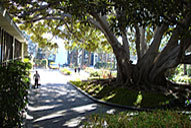
Miramar Moreton Bay Fig Tree - with man - photo by Michael Grandcolas
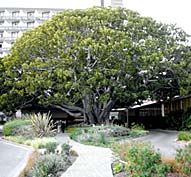
Miramar Moreton Bay Fig Tree - in shade - photo by Michael Grandcolas
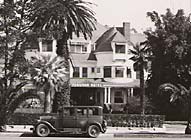
Miramar Hotel
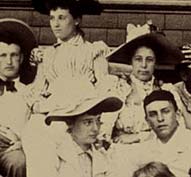
Young Roy Jones, far right
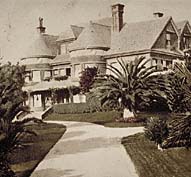
Miramar, home of Senator John Percival Jones built 1887
Connie Cramer Collection
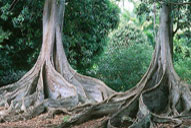
Moreton Bay Fig Trees (Ficus macrophylla) Kauai, Hawaii
by Roddy Scheer
Ficus macrophylla is a native of east Australia. When it is grown in an open area where it can spread, the Moreton Bay Fig may become as much as 150 feet wide; but crowded in its natural forest habitat--or near buildings in an urban setting--it tends to grow tall and narrow. The story of this Moreton Bay Fig Tree dates back to the 1880s, when Santa Monica was a summer holiday spot. An Australian sailor had been drinking at the Rapp Saloon, or someplace similar. When the bill came, he had no money to pay for his drinks. The Aussie bartered with the bartender, offering him a Moreton Bay Fig Tree sapling instead of cash. Figuring it was this or nothing, the bartender accepted. Having no interest in plants, the bartender then gave the sapling to the wife of Senator Jones, who requested that her gardener plant it in the yard of their estate.
Their home has since been replaced by the Fairmont Miramar Hotel, but
the tree remains. Since 1921, the hotel has welcomed such illustrious
guests as Howard Hughes, and Mrs. John F. Kennedy.
In 1924, the six-story Palisades Wing was constructed to provide apartments
for guests who planned lengthy stays at the beach. Scandinavian beauty
Greta Garbo was one of the first celebrity guests to move into the wing
and resided there for more than four years.
Nestled amid the hotel's beautifully landscaped gardens are 32 luxurious
poolside bungalows, the only accommodations of this type in Santa Monica.
These spacious rooms and bi-level suites are separated from the main buildings
by the gardens and strategically placed fountains. Sporting sea blue-gray
slate roofs, each bungalow is accessed through a private entrance, one
reason they have been popular with celebrities seeking a higher degree
of privacy.
Sultry blonde Jean Harlow rented one of the Miramar's bungalows in the
early 1930s, and years later another famous blonde, Marilyn Monroe, frequently
retreated to the Miramar when she wanted to disappear from the media.
Throughout the years, the bungalows have attracted their share of public
figures, including Eleanor Roosevelt and aviator Charles Lindbergh.
The Miramar has also hosted a number of distinguished political guests
including former President John F. Kennedy, who was a frequent visitor
in the early 1960s. In 1992, while campaigning for President, Governor
Clinton stayed in a tenth floor suite at the Miramar. The newly-elected
President Clinton stayed there during a second visit in 1994, accompanied
by guests Barbara Streisand, Steven Spielberg and wife Kate Capshaw.
For the record, the largest Moreton Bay Fig Tree still standing in California
was planted in Santa Barbara in 1877 on land then owned by the Southern
Pacific Transportation Company. The tree was officially designated as
a historic landmark in 1970 and the property was deeded to the City of
Santa Barbara in 1976. It is believed to be the largest of its kind in
the United States. In 1991, the branch spread was measured at 167 feet
with a total height of 76 feet. The trunk diameter above the buttress
roots is 12.5 feet.
San Diego is also known for its Moreton Bay Fig Trees, they were planted in the Prado area of Balboa Park, in preparation for the 1915 exposition. One in that area is also listed in the California Registry of Big Trees as one of the champion trees of the state. According to the registry, in 1996, the tree measured about 78 feet (24 meters) high, with a crown width of 123 feet (37 m) and a trunk girth of 486 inches (12.3 m). The Moreton Bay Fig tree of Santa Barbara, California, has a broader canopy but is not as high.
The small dry fruits of the Moreton Bay Fig--like those of other figs--are
actually composed of hundreds of tiny flowers completely enclosed within
the inverted fleshy tissue of the receptacle upon which they rest. A tiny
hole (called an ostiole) in the tip of the fruit allows minute symbiotic
wasps, which pollinate and lay their eggs within the flowers, to enter
and leave the structure.